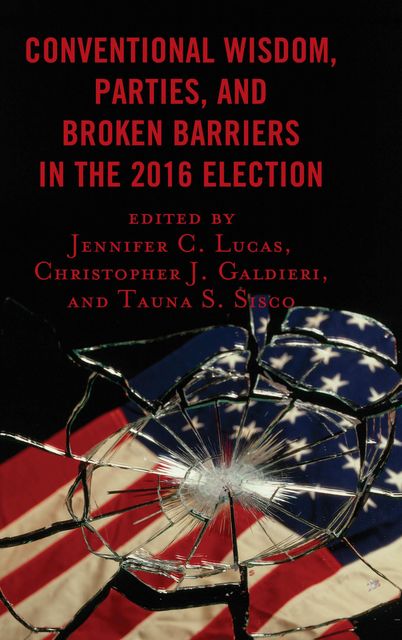We use cookies to improve the Bookmate website experience and our recommendations.
To learn more, please read our Cookie Policy.
To learn more, please read our Cookie Policy.
Accept All Cookies
Cookie Settings
Something went wrong. Try again.

Read in our apps:
iOS
·Android
Mark Brewer,Atiya Kai Stokes-Brown,Chad Kinsella,Christopher Chapp,Dan Hofrenning,Jack D. Collens,Jennifer C. Lucas,Julia R. Azari,Kevin J. McMahon,Matthew D. Atkinson,Richard Powell,Robert G. Boatright,Seth,Terri Susan Fine,Tyler Benning
Conventional Wisdom, Parties, and Broken Barriers in the 2016 Election
Notify me when the book’s added
Impression
Add to shelf
Already read
Report an error in the book
Share
Facebook
Twitter
Copy link
To read this book, upload an EPUB or FB2 file to Bookmate. How do I upload a book?
The 2016 presidential election was unconventional in many ways. The election of President Donald Trump caught many by surprise, with a true outsider — a candidate with no previous governmental experience and mixed support from his own party — won the election by winning in traditionally Democratic states with coattails that extended to Republican Senate candidates and resulted in unified Republican government for the first time since 2008. This result broke with the pre-election conventional wisdom, which expected Hillary Clinton to win the presidency and a closer Senate divide. This surprising result led many political scientists to question whether 2016 truly marked a major turning point in American elections as portrayed in the media — a break from the conventional wisdom – or whether it was really the exception that proved the rule.
In this volume, political scientists examine previous theories and trends in light of the 2016 election to determine the extent to which 2016 was a break from previous theories. While in some areas it seems as though 2016 was really just what would have been predicted, in others, this election and the new president pose significant challenges to mainstream theories in political science. In particular, prominent political scientists examine whether voter trends, with particular focus on groups by gender, age, geography, and ethnicity, and election issues, especially the role of the Supreme Court, followed or bucked recent trends. Several political scientists examine the unconventional nomination process and whether this signals a new era for political parties. The role of conspiracy theories and voter confidence in the administration of elections are also discussed. Finally, contributors also examine the indirect effect the presidential candidates, especially Trump, played in congressional election rhetoric.
In this volume, political scientists examine previous theories and trends in light of the 2016 election to determine the extent to which 2016 was a break from previous theories. While in some areas it seems as though 2016 was really just what would have been predicted, in others, this election and the new president pose significant challenges to mainstream theories in political science. In particular, prominent political scientists examine whether voter trends, with particular focus on groups by gender, age, geography, and ethnicity, and election issues, especially the role of the Supreme Court, followed or bucked recent trends. Several political scientists examine the unconventional nomination process and whether this signals a new era for political parties. The role of conspiracy theories and voter confidence in the administration of elections are also discussed. Finally, contributors also examine the indirect effect the presidential candidates, especially Trump, played in congressional election rhetoric.
more
This book is currently unavailable
434 printed pages
Have you already read it? How did you like it?
👍👎
fb2epub
Drag & drop your files
(not more than 5 at once)

